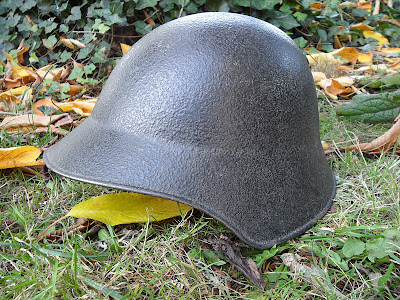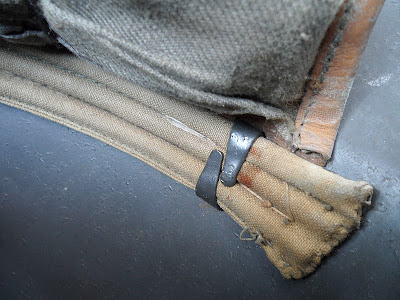This helmet is the first steel helmet that was issued to the Swiss troops. The helmet was designed in 1918 and was issued out to the troops around 1924. The original finish was smooth and the headliner was fully circular. In 1940, the helmet shell was very slightly refined and a new production run was made with headliners that were only 3/4 circular. The paint finish on these M40 helmets was still smooth and green. In 1943, the helmets were all recalled and a new black, textured paint was applied to the shell. These helmets are known as the M43 helmets. The M43 is the helmet that I have.
Here is an outstanding website that covers these helmets in depth. The site has lots of photos and is quite extensive. The site is in Spanish, but quite easy to figure out if you don't speak the language......:or you can just copy and paste the text into Google Translator and read it in your own native tongue.
http://www.cascoscoleccion.com/suiza/su1840.htm
http://www.cascoscoleccion.com/suiza/suiza.htm
Here is the link to the website's main collection page that lists helmets from numerous countries:
http://www.cascoscoleccion.com/portada.htm
These Model 1918 helmets in all the variations, were used through the 1960's, and into the mid 1970's, when the new Model 1971 steel helmets were issued as a replacement style (no visor or flared skirt and new style liner...... a modern steel helmet!). Prior to being pulled from service, a last variation was made in the Model 1918 styled helmet. A new headliner was fitted that did away with the lacing eyelets in the crown of the headliner in 1963. The helmets with this last headliner are referred to as M63,
My helmet is the Model 1940 that was repainted in 1943 with the black textured paint. This makes my helmet a M40-43........... (There are quite a number of ways to describe this model: M18-43, M43, M40-43, Model 1918-43, and probably a few others not listed!).
The helmet in my collection is in fantastic shape for its age. Inside the helmet, tied to the liner, is an old tag that lists the previous owner's name.
Here is the photo album of my helmet:
UPDATE: I have a posting that shows the WW2 camo helmet cover for these helmets. You can see it here:
http://sharky-fourbees.blogspot.com/2011/11/swiss-m40-43-helmet-cover-1943-1956-for.html
Here are two videos that do a good job of showing this style helmet in use. It is interesting to note that in the first video, the two soldiers firing the rocket launcher, are both wearing their helmets backwards! This must have been for a bit of extra protection from while firing in the prone position........
And to finish things off, here is an album of historic photos showing these helmets being worn in the field ( I found the first photo a bit humorous!):
Here is an outstanding photo showing the uniform and equipment that the WW2 era Swiss soldier would have been carrying and wearing in the field:
Here are a series of photos showing how the original Model 1918 run of helmets were made:


































5 comments:
Thanks for posting these production photos. I've never seen these for this helmet
Excellent article and photographs! Really enjoy seeing your helmet collection and it has helped me to add info details to my collection I was lacking. Do you have the WW2 issue cover for this model?
I am glad you have found these blog posting so useful. I enjoy researching as much as collecting, and this is my place to show some off the items in the collection, and at the same time make my research available to others.
I am aware of only three covers that were made for these helmets, the version that I have shown with my helmet (Fall Version), a white cover and sometimes the post-war made "Alpenflage" covers that were actually made for the later helmets. These reversible "fall covers" were actually the WW2 cover.
I also have a blog posting that shows the WW2 Fall, reversible helmet cover that was made for these helmets:
http://sharky-fourbees.blogspot.com/2011/11/swiss-m40-43-helmet-cover-1943-1956-for.html
Nowhere is any mention made of the all-important matter of helmet sizing! The majority of these helmets were produced in a smaller size, since ergonometric research indicates that the majority of European soldiers (and most of the Swiss population) have smaller-sized, ROUND head shapes. Consequently, the larger size M18 helmet is a rare beast, indeed, and unusual to run across! Smaller sizes (58 cm and below) were indicated by a printed 'A' character on the inside, rear shell, whereas the larger size (59 cm and above) was differentiated with a 'B' character. Later iterations (M18/63, etc.), often seem to lack any 'small/large' size identifications at all on them, which is still a subject of research I am conducting. -K2
Post a Comment